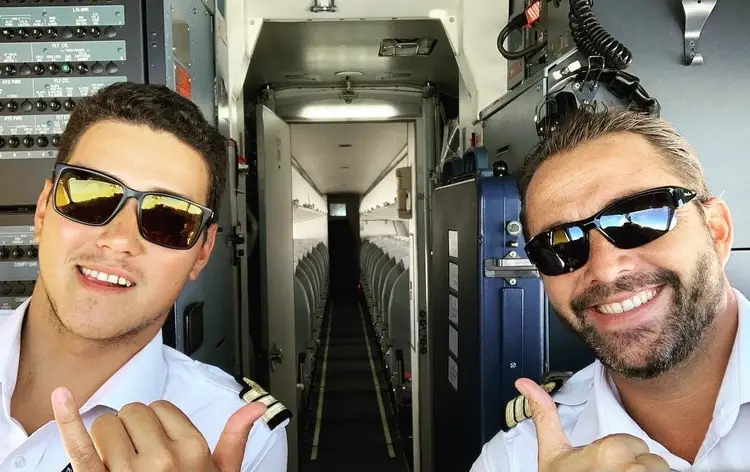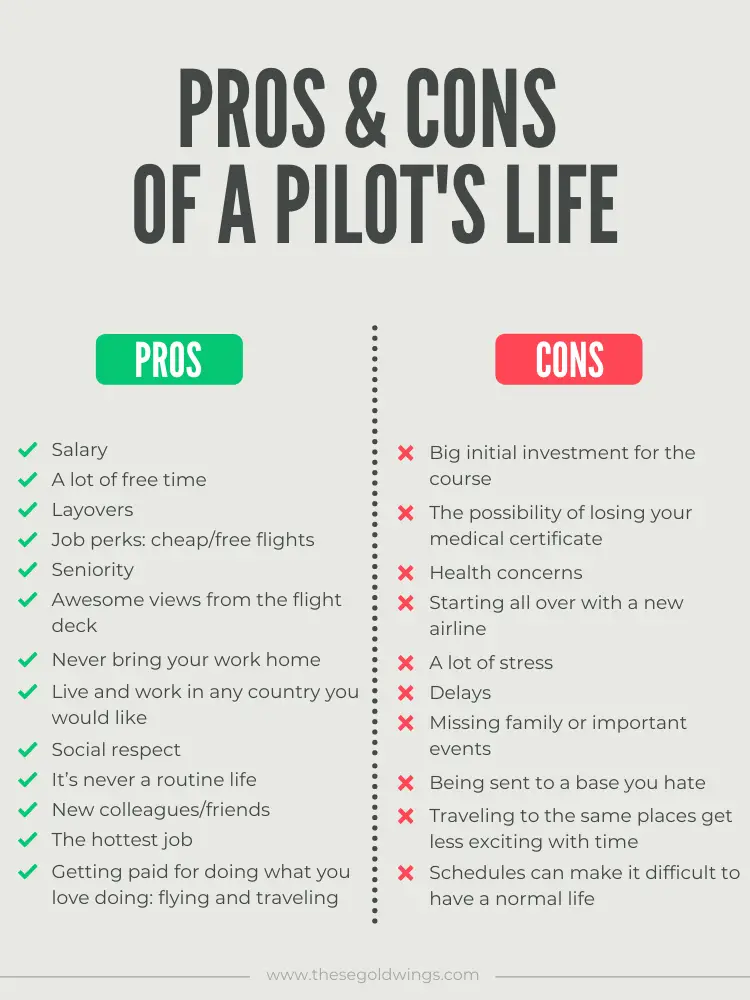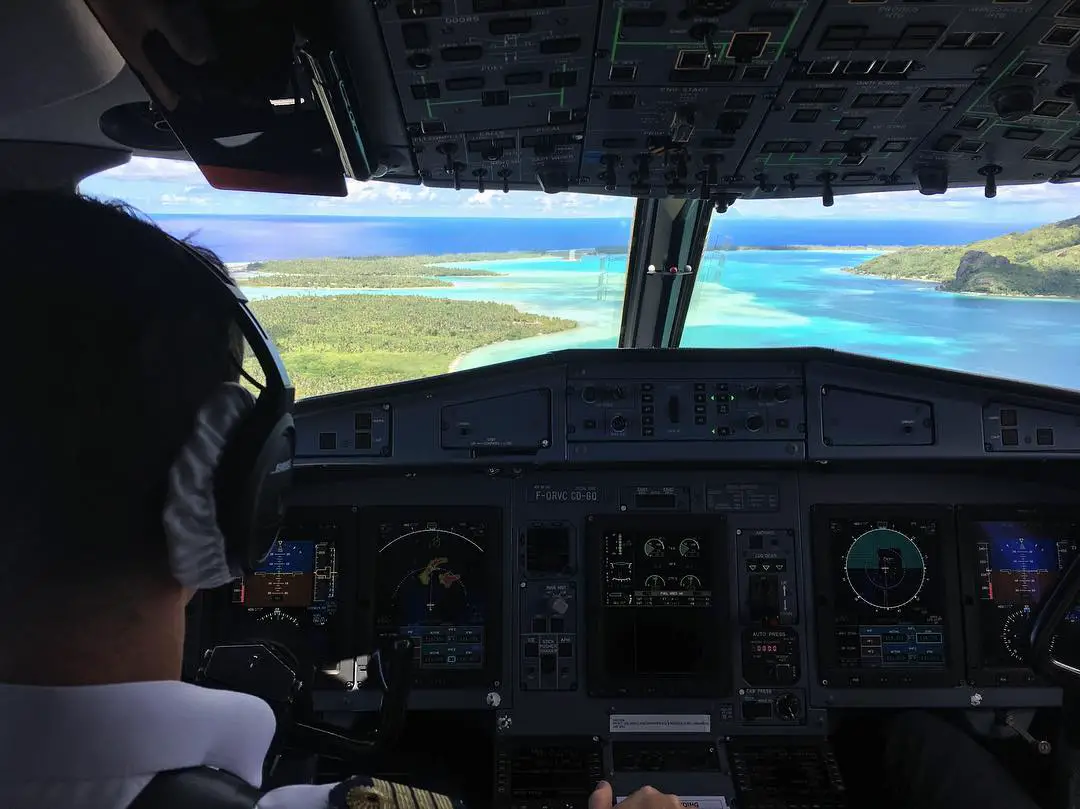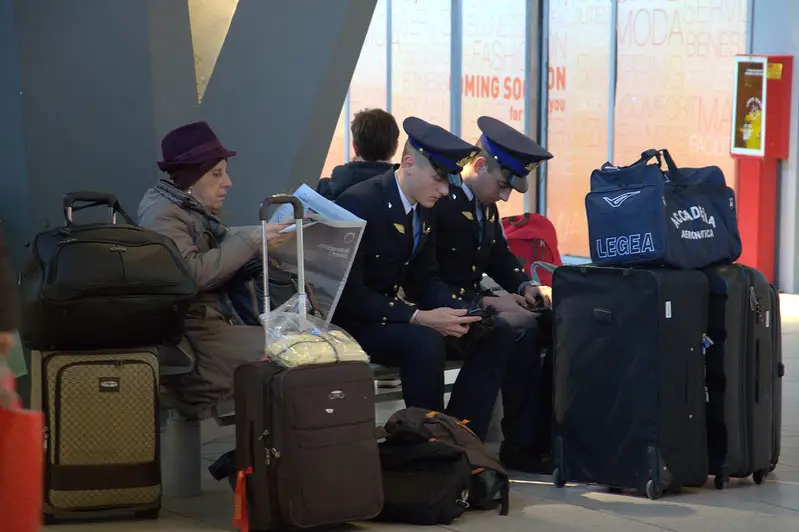
Being a pilot is a dream job for many. But apart from spending their days in the skies and earning quite a decent salary, a pilot’s life can be pretty hard to imagine.
So let’s take a closer look, shall we?
Table of Contents
Does a pilot have a social life: family life, private life?
Yes, but not weekends, and don’t take having birthdays or Christmas off for granted.
Because of the unusual working schedules, pilots don’t usually get the luxury of weekends off, so they can’t count on that Sunday lunch with the family and holidays are not something that they can count on at a time that suits them.
As rosters are only issued month by month, it can be quite difficult to plan long term important events and it’s very annoying if you have to miss them.
So, yes, pilots do have a social life but it’s not one that the average person would understand.

What is the life of a pilot like?
Pilot life is significantly different based on factors like the type of airline, the specific role (captain or first officer), and the company’s conditions.
Being a commercial airline pilot, especially on long-haul flights, is a whole different ball game compared to those on short-haul.
Long-haul pilots typically experience multiple time zones, spending extended periods away from home, and navigating the challenges of jet lag. But also they have the opportunity to spend more time exploring the destinations they visit.
Short-haul pilots, on the other hand, usually have a more consistent routine, flying shorter routes and returning home more frequently. This can be a great option for those who value family life and prefer a predictable schedule.
Private aviation pilots face a different reality, often dealing with unpredictable schedules due to being on call for most of their time.
For those in low-cost airlines, it’s a bit more structured with fixed rosters, like working five days and having four days off. This allows them to be home most nights, making it easier to balance work and life.
But hey, keep in mind, these are just general ideas.
Pilot conditions can really differ a lot. Things like pay, schedules, days off, holidays, rules, and responsibilities—they all depend on the company.
As pilots move up the seniority ladder, their schedules usually get better, and juggling work and life becomes more doable.
So, the pilot life? It’s a mixed bag.
It really depends on your preferences, where you’re based, and the kind of conditions you’re working in.
Is being a pilot tough?
Being a pilot has its tough, no doubt.
Irregular schedules, time away from home, and dealing with jet lag can be a real challenge.
There’s also the responsibility of keeping everyone safe, which can get stressful.
But you know what? A lot of pilots are happy with what they do.
They’re doing what they love and have the chance to explore new places. Plus, they share time and make good friends with other crew members, and the unique experiences make it all worthwhile.
So, is it hard? Yeah, at times. Is it happy? For many, absolutely.
Pros and Cons of a pilot’s life
As in all other jobs being a pilot has advantages and disadvantages, it’s not all fun.
To help you know more and to evaluate all aspects of a pilot’s life, here are some pros and cons.

PROS
- Salary: Pilots enjoy competitive salaries, especially as they gain experience and climb the ranks within the aviation industry. Alongside attractive base pay, many airlines offer additional benefits such as health insurance, retirement plans, and travel perks, making it a financially rewarding career.
According to research conducted by Glassdoor, in 5 years they can be earning $100,000 a year if you are upgraded to Captain, and that’s hard to beat. - A lot of free time: despite their schedule, pilots get a lot of time off, unlike many other professions.
This allows them the flexibility to pursue their hobbies or to do whatever they want. - Layovers: You can end up with layovers in wonderful places like the Caribbean and you will definitely be visiting countries and places that you never would have done otherwise.

- Job perks: cheap/free flights for you and your partner, family and friends, and even hotel discounts.
- Quality of life: Once you gain seniority in your airline you can normally get better schedules and work more or less what you want. The quality of life is better and so are the pay increases.
- Awesome views from the flight deck: The views pilots get are priceless, always different and breathtaking.
Many pilots are into photography and they have amazing sunset photographs, northern light photos or – my favorite – pictures of planes zipping past above or below them. - You never bring your work home: When you walk out of the airport at the end of your trip, you are truly done working. That is a very, very, big plus.
- Live and work in any country you would like: There are many airlines and countries to choose from, the career path of a pilot is virtually boundless.
- Social respect: it may sound silly, but people in general respect you more. Embrace it.
- It’s never a routine life, every day is different.
The people, the crew you fly with, the destination, the route, the landscape, the schedule, everything is different every day. - New colleagues/friends: you meet a lot of crew that share the same passion for travel as you and you can share advice on tips about where to go and what to do.
- The hottest job: Being a pilot is a magnet for interest and attraction, no wonder it’s the most right-swiped job in Tinder!
- Getting paid for doing what you love doing: flying and traveling.
CONS
- Big initial investment for the course: From $70,000 to $130,000 and no job guarantee.
Becoming a pilot isn’t cheap. And starting salaries are quite low.
Plus it’s not so easy to find a job at the beginning. - The possibility of losing your medical certificate. The greatest fear among pilots: Lose your medical certificate for whatever health reason and you’ll lose your pilot license too, which automatically means losing your job.
This can be tough, depending on your age or your personal situation. - Health concerns: Long working days, irregular sleeping patterns, plus being constantly traveling can take a toll on health.
You may think crewmembers are used to all that but nobody gets really used to jet lag or having to get up at 4 a.m. - Other pilot health risks: Pilots and flight attendants are exposed to cosmic radiation, which in the long term can cause cancer and also to toxic cabin air, which has been linked to cancer, neurological problems, and fatigue.
- Starting all over with a new airline: When you change airline or you lose your job at an airline, you have to start all over again at the very bottom, with an entry-level salary, and a lousy schedule for years.
- A lot of stress: dealing with pressure for on-time departures, the storms, coordinating with maintenance, the dispatcher, flying non-rev (on standby basis) to commute to work, the big responsibility, ATC delays, and fatigue are all stress triggers.
- Delays: Not only is there less resting time or less time to enjoy at destination, but you also don’t get paid while you’re not flying.
Plus dealing with angry passengers while you can’t do anything about it’s not the greatest fun in the world.

- Missing family or important events: You cannot be guaranteed to have a certain day off.
There’s nothing worse than getting to the hotel in Portland at 1 pm for a 24 hour overnight with a crew you don’t even like and knowing you can’t be with your friends and family at your friend’s wedding. - Being sent to a base you hate: You can be based somewhere that you don’t want to go and you’ll have to move there (away from your family and friends) and have to commute home on your days off to get away from your hated base (which can involve sitting at the airport for hours to catch your flight home after a long day working) or have the unpleasant alternative of staying where you are and having a lonely time.
- Traveling to the same places get less exciting with time: Once you’ve stayed at the same destination many times it gets less exciting, plus sometimes you only have 10 hours rest there, so your only option is just to stay in the hotel room doing nothing.
- Schedules can make it difficult to have a normal life. Being on reserve is one of the worst things of all, because you can’t really plan anything as you might have to leave.
So you are sitting around and waiting for the airline to call you and tell you where to go and pack, and you have to be able to report to work within 1 hour 30. Sometimes is better to have a tough line, because at least you know when you finish.
Conclusion: Is being a pilot a good life?
Being a pilot is a rewarding career with a very unique lifestyle.
The perks, such as a competitive salary and travel benefits, shine brightly. But there are challenges too like unusual and tiring schedules, stress, and considerable time away from home. It’s not all glamour, but if you’re aware of the drawbacks, you may find it worthwhile. In conclusion, the pilot career might not suit those seeking stability and a normal lifestyle, but for those embracing change and seeking an extraordinary journey, it’s an unmatched path.
